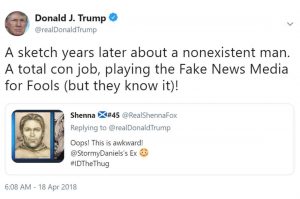Few would argue that President Trump engages in what could be described colloquially as “rhetorical hyperbole” when logged on to his Twitter account. But a recent court finding that dismissed a defamation suit filed against Trump by porn star Stormy Daniels, on the grounds that a tweet by the president could legally be described in those terms, rather than as potentially factual statements—defamation cases require that a statement be factually false—could have a significant effect on how libel law applies to social media going forward.
Daniels, whose real name is Stephanie Clifford, alleges that she and her daughter were threatened on the street in Las Vegas for agreeing to participate in an In Touch magazine article about her past relationship with the president. “Leave Trump alone. Forget the story,” she was allegedly told in May 2011.
 After Trump’s election, Daniels commissioned a sketch artist to create a rendering of the person who had threatened her, and she released the sketch publicly on April 17, 2017. On the next day, a tweet from @RealDonaldTrump read, “A sketch years later about a nonexistent man. A total con job, playing the Fake News Media for fools (but they know it)!”
After Trump’s election, Daniels commissioned a sketch artist to create a rendering of the person who had threatened her, and she released the sketch publicly on April 17, 2017. On the next day, a tweet from @RealDonaldTrump read, “A sketch years later about a nonexistent man. A total con job, playing the Fake News Media for fools (but they know it)!”
 Chicago Business Attorney Blog
Chicago Business Attorney Blog

